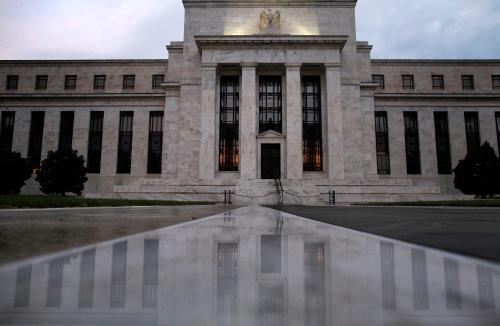This is an updated version of the paper originally posted in August 2017.
The global financial crisis prompted many countries to set up new authorities to address financial stability risks. But the extent to which these institutional arrangements afford authorities the ability to implement macroprudential and, in particular time-varying policies, is unclear. In this updated paper, Rochelle Edge of the Federal Reserve Board of Governors and Nellie Liang, Miriam K. Carliner Senior Fellow in Economic Studies at Brookings study these authorities to determine their ability to set macroprudential policies to reduce potential systemic risks that could arise, for example, from rapidly rising house prices or persistently low interest rates.
Using a new dataset for 58 countries, Edge and Liang find that multi-agency financial stability committees (FSCs) have become an increasingly important institutional arrangement since the crisis. In the decade after 2008, the number of countries with FSCs grew from 11 to 47, while the number of countries with single regulatory agencies dedicated to financial stability has remained constant. However, only about one-quarter of these committees have both good processes and good tools to take macroprudential actions, and most have been designed instead to improve communication and coordination among existing regulators. Most FSCs also broaden the political legitimacy of macroprudential policy by involving the ministry of finance, who often serves as the chair.
Central banks may be a natural alternative to an FSC for implementing macroprudential authority. But Edge and Liang document that most do not have the ability to use macroprudential tools or take preemptive action against financial stability risks. In addition, central banks that have more political independence for setting monetary policy and supervisory regulation are among the least likely to have the ability to implement macroprudential policies. This indicates that countries have focused on strengthening the political legitimacy of macroprudential policies and avoided conferring more authority on already strong central banks.
The evidence indicates countries have placed a relatively low weight on the ability of policy institutions to take action and relatively high weight on political economy considerations. As a result, say Edge and Liang, few countries have institutional arrangements through which FSCs or regulatory agencies may set macroprudential policy in a way that effectively addresses cyclical systemic risks.
Read the full paper here.
The Brookings Institution is committed to quality, independence, and impact.
We are supported by a diverse array of funders. In line with our values and policies, each Brookings publication represents the sole views of its author(s).








